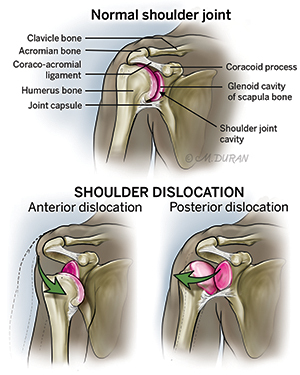About Shoulder Instability
Shoulder instability occurs when the head of the upper arm bone is forced out of the shoulder socket. This can happen following sudden injury or from overuse. Once the ligaments, tendons and muscles around the shoulder become loose or torn, dislocations can occur. When the shoulder is loose and slips out of place repeatedly, it is called chronic shoulder instability.
Depending on the severity of your injury and your activity level, nonsurgical treatment may be the best option to relieve pain and improve function, however, if improvement does not occur surgical treatment may be required. Our orthopedic surgeons and sports medicine providers work with you on developing a specialized treatment plan with your goals in mind with a team dedicated to helping you every step of the way.

Symptoms of Shoulder Instability
Common symptoms of chronic shoulder instability include:
- Pain caused by a shoulder injury
- Persistent sensation of the shoulder feeling loose, slipping in and out of the joint, or just “hanging there”
- Repeated instances of the shoulder giving out
- Repeated shoulder dislocations
Risk Factors for Shoulder Instability
Certain people are at greater risk for shoulder instability.
Risk factors for shoulder instability may include:
- Age: Shoulder instability is more common among people under 40.
- Personal history: Injuries that cause shoulder instability are more common in contact sports.
- Sex: Men are more likely to experience recurrent shoulder dislocations following an initial injury.
Treating Shoulder Instability at UT Health Austin
Upon evaluation of your shoulder, your medical provider will discuss nonsurgical treatment option as an initial approach to healing the joint and improving function. These options often include activity modifications and rest, nonsteroidal anti-inflammatory medication such as ibuprofen, physical therapy and strengthening exercises. In rare cases, arthroscopic surgery may be suggested as a treatment option if your shoulder pain and function do not improve. Your care team will walk you through the risks and benefits as well as what to expect throughout your recovery process.
Care Team Approach
At UT Health Austin, we take a multidisciplinary approach to your care. This means you will benefit from the expertise of multiple specialists across a variety of disciplines caring for you in one place to avoid having to schedule multiple appointments with providers at locations all over the city. The Sports and Injury Clinic care team includes orthopedic surgeons, sports medicine physicians, physiatrists, physical therapists, chiropractors, nurse practitioners, dietitians, social workers, and more, who work together to help you get back to the things in your life that matter most to you.
We also collaborate with our colleagues at The University of Texas at Austin and the Dell Medical School to utilize the latest research, diagnostic, and treatment techniques, allowing us to provide you with comprehensive, whole-person orthopedic care to help you meet your goals. Treatment may include non-surgical interventions, such as lifestyle modifications, physical therapy, or medication and injections, or surgery may be the best course of action to help improve your pain and function. Advanced imaging and lab testing are also available on-site if needed.
More About Your Care Team

Musculoskeletal Institute
Health Transformation Building, 9th Floor
1601 Trinity Street, Bldg. A, Austin, Texas 78712
1-833-UT-CARES (1-833-882-2737)
Get Directions

Sports and Injury Clinic
Health Transformation Building, 9th Floor
1601 Trinity Street, Bldg. A, Austin, Texas 78712
1-833-UT-CARES (1-833-882-2737)
Get Directions